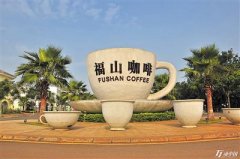Only "4C" beans are selected when purchasing coffee beans in Yunnan.
Coffee is one of the most popular drinks in the world today, with global consumption of more than 1.5 billion cups a day. Today, Nestle Coffee is almost synonymous with coffee because the world consumes 4600 cups of Nestle coffee per second. In order to meet consumer demand, Nestl é has set up 26 Nestle coffee production plants around the world, two of which are located in China. After several years of training and preparation, since the beginning of the 2014-2015 procurement season, all coffee beans purchased by Nestl é in Yunnan have passed 4C certification.
In order to help Yunnan coffee industry comply with the development trend of the international coffee industry and help coffee growers integrate with international standards, with the support of the local government and partners, Nestle coffee experts have conducted free training on 4C (Common Code for the Coffee Community, the general management rules of the coffee community) to coffee farmers and coffee companies with long-term cooperative relations since 2012. Up to now, more than 2600 partners in five batches have passed 4C certification, benefiting nearly 36000 farmers, covering nearly 200000 mu of acreage.
4C is a widely accepted management rule in the world, which involves the sustainable development of all aspects of the supply chain, such as coffee cultivation, production, processing and marketing, aiming at promoting the sustainable development of coffee production, processing and trade. More and more international coffee buyers require that the coffee they buy must meet the requirements of 4C or equivalent. In the coffee bean purchasing season from 2012 to 2013, more than 1 / 3 of the coffee beans purchased by Nestle's Pu'er purchasing station meet the 4C standard and are mainly exported to the international market. At the same time, in order to encourage farmers to produce high-quality coffee in a sustainable way, Nestl é has set up a "4C incentive to create shared value Fund" since 2013. In the 2014-2015 purchasing season, Nestl é fulfilled its previous commitment to purchase 100% of 4C certified coffee beans.
Mr. Hute, head of Nestl é Yunnan Coffee expert Group, said: "in order to ensure the smooth development of the 2014-2015 procurement season, Nestl é Pu'er agronomic service team has invested a lot of time and energy. In this way, on the one hand, it can help them tap their production potential, improve coffee quality and increase their income; on the other hand, it will help Yunnan's coffee planting industry to improve the basic management of the coffee growing industry from the social, environmental and economic aspects of the 4C management principles, and to carry out coffee cultivation in a sustainable way. "
As the first multinational company to invest in agriculture in southwest China, Nestl é, adhering to the consistent company management philosophy of "creating shared value" for 26 years, has been committed to cooperating with relevant departments in Yunnan to jointly promote the industrialization of coffee. After 26 years of efforts, Nestle's hard work in Yunnan has had a profound impact on the coffee industry and economic development in the region. At present, Yunnan has gradually developed into a high-quality small-seed coffee bean producing area with vigorous development, rich profits and deeply concerned by the global coffee industry. Nestle's coffee development project in Yunnan has won recognition from all walks of life, won the United Nations "2012 World Business and Development Award", and was awarded the United Nations "2012 Global Compact China Best practices" in the same year.
Important Notice :
前街咖啡 FrontStreet Coffee has moved to new addredd:
FrontStreet Coffee Address: 315,Donghua East Road,GuangZhou
Tel:020 38364473
- Prev

A cozy Fushan Coffee Tour in China's Coffee Market
At 9: 00 in the morning, I spent 430 yuan to fill up the 65-liter fuel tank at the gas station. Because it was a diesel car, it was very convenient to refuel, so I hardly stood in line. Due to the stagger of the travel peak in the first three days of the National Day, the traffic condition is not as bad as reported in the newspaper, while the western highway is much better after several repairs, basically no different from the eastern highway. Pollig's 2.
- Next

Coffee Health Research Coffee compounds prevent obesity-related diseases
It is well known that in addition to weight gain, two other common side effects of obesity are increased insulin resistance and liver fat accumulation, which can lead to diabetes and poor liver function if left untreated. Now, researchers at the University of Georgia in the United States have found that chlorogenic acid (CGA), a common compound in coffee, helps prevent the destructive effects of obesity.
Related
- What grade does Jamaica Blue Mountain No. 1 coffee belong to and how to drink it better? What is the highest grade of Blue Mountain coffee for coffee aristocrats?
- What are the flavor characteristics of the world-famous coffee Blue Mountain No. 1 Golden Mantelin? What are the characteristics of deep-roasted bitter coffee?
- Can I make coffee a second time in an Italian hand-brewed mocha pot? Why can't coffee be brewed several times like tea leaves?
- Hand-brewed coffee flows with a knife and a tornado. How to brew it? What is the proportion of grinding water and water temperature divided into?
- What is the difference between Indonesian Sumatra Mantinin coffee and gold Mantinin? How to distinguish between real and fake golden Mantelin coffee?
- What does bypass mean in coffee? Why can hand-brewed coffee and water make it better?
- Unexpected! Ruixing Telunsu lattes use a smoothie machine to foam milk?!
- % Arabia's first store in Henan opens into the village?! Netizen: Thought it was P's
- Does an authentic standard mocha coffee recipe use chocolate sauce or powder? Mocha Latte/Dirty Coffee/Salty Mocha Coffee Recipe Share!
- What is the difference between Vietnam egg coffee and Norway egg coffee? Hand-brewed single product coffee filter paper filter cloth filter flat solution!

